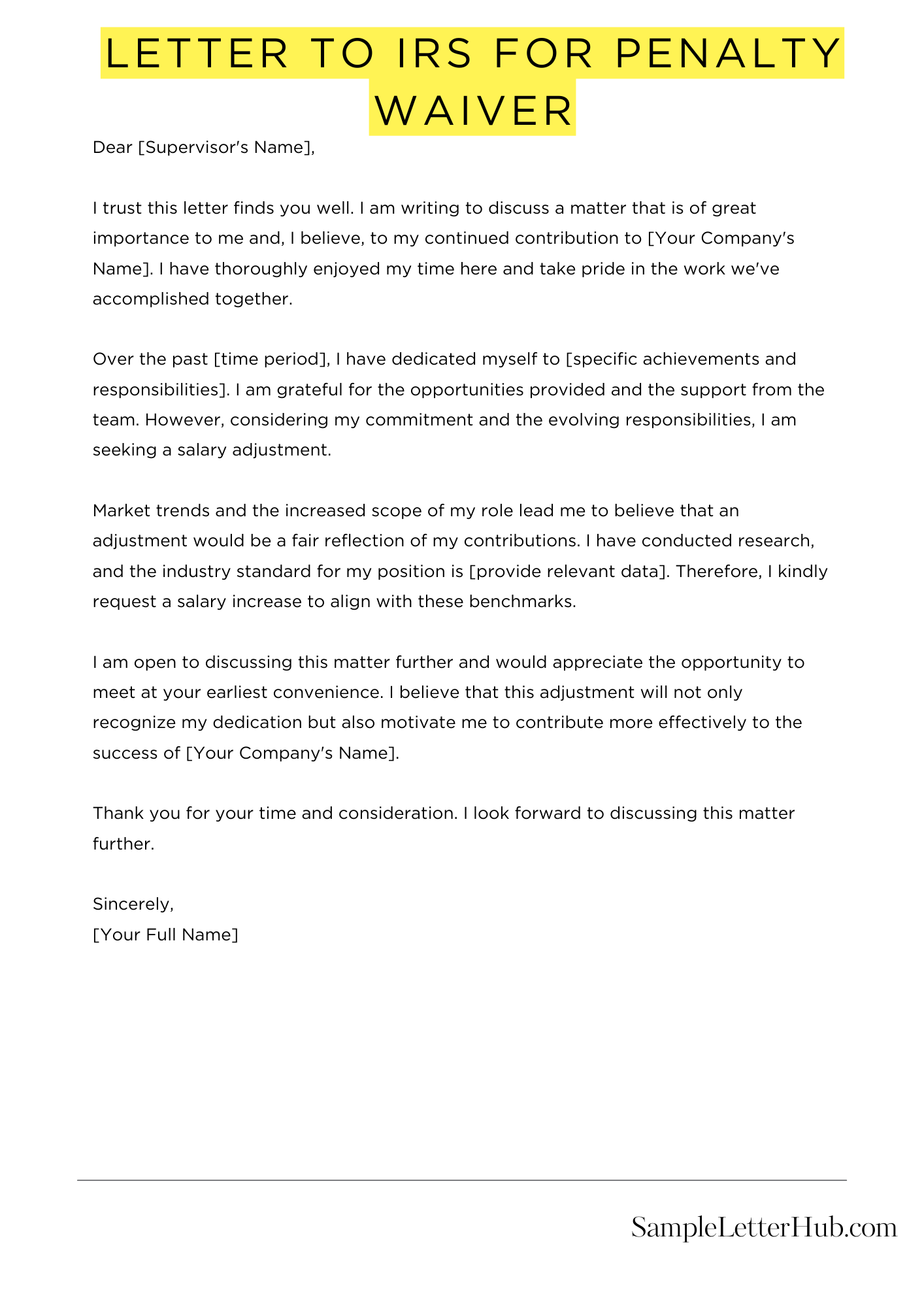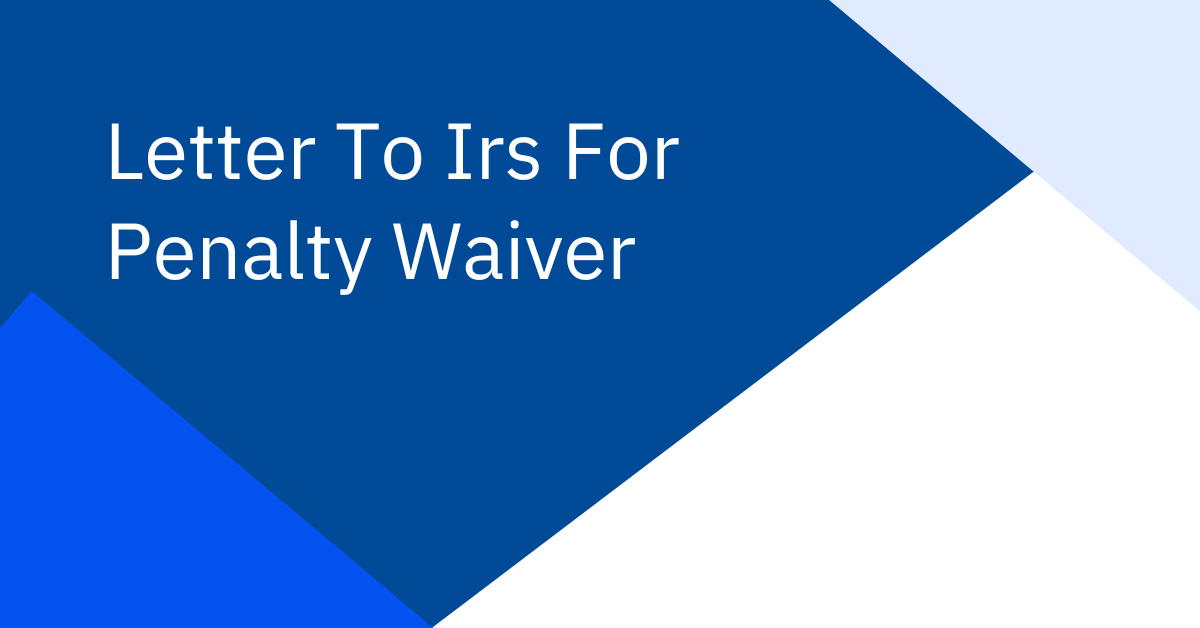If you owe the IRS money, you may be able to get the penalties waived. One way to do this is to write a letter to the IRS requesting a penalty waiver.
In this article, we will provide you with templates, examples, and samples of letters to the IRS for penalty waivers. These letters will help you get started on your own letter and make the process of requesting a penalty waiver easier.
The IRS has specific requirements for penalty waiver letters. Be sure to include all of the required information in your letter, such as your name, address, taxpayer ID number, the tax year(s) for which you are requesting the waiver, and the reason for your request.
Letter to IRS for Penalty Waiver
Dear IRS,
I am writing to request a waiver of the penalty imposed on my 2022 tax return. I understand that I am responsible for paying my taxes on time, and I regret that I was unable to do so this year.
I have been experiencing financial hardship due to [briefly explain the reason for the hardship]. As a result, I was unable to set aside funds to pay my taxes. I have since taken steps to improve my financial situation and am now able to pay my tax liability in full.
I have enclosed a copy of my financial records to support my request. I believe that my circumstances warrant a waiver of the penalty. I have always been a compliant taxpayer and have never had any issues with the IRS before.
I would be grateful if you would consider my request. I am committed to fulfilling my tax obligations and appreciate your understanding.
Thank you for your time and consideration.
Sincerely,
[Your Name]

How to Write Letter To Irs For Penalty Waiver
If you have received a penalty notice from the IRS, you may be able to get it waived. To do this, you will need to write a letter to the IRS explaining your situation and why you believe the penalty should be waived.
What to Include in Your Letter
Your letter should include the following information:
- Your name, address, and phone number
- The date of the penalty notice
- The amount of the penalty
- The reason why you believe the penalty should be waived
- Any supporting documentation that you have
How to Write Your Letter
Your letter should be written in a clear and concise manner. It should be easy for the IRS to understand your situation and why you believe the penalty should be waived.
You should start your letter by introducing yourself and explaining the reason why you are writing. Then, you should provide a brief overview of your situation and why you believe the penalty should be waived.
Next, you should provide any supporting documentation that you have. This could include copies of tax returns, receipts, or other documents that support your claim.
Finally, you should conclude your letter by restating your request for a penalty waiver. You should also thank the IRS for their time and consideration.
Tips for Writing a Successful Letter
Here are a few tips for writing a successful letter to the IRS:
- Be clear and concise.
- Provide all of the necessary information.
- Be polite and respectful.
- Proofread your letter carefully before sending it.
Conclusion
If you have received a penalty notice from the IRS, you may be able to get it waived by writing a letter to the IRS. By following the tips in this article, you can increase your chances of success.
FAQs about Letter To Irs For Penalty Waiver
What is a penalty waiver?
A penalty waiver is a request to the IRS to forgive a penalty that has been assessed against you. The IRS may grant a penalty waiver if you can show that you had a reasonable cause for not paying your taxes on time or that you are unable to pay the penalty.
What are the most common reasons for requesting a penalty waiver?
The most common reasons for requesting a penalty waiver are:
- Reasonable cause, such as a serious illness, natural disaster, or death in the family
- Inability to pay, such as financial hardship or unemployment
- First-time penalty, such as a penalty for filing a late return
How do I request a penalty waiver?
You can request a penalty waiver by writing a letter to the IRS. Your letter should include the following information:
- Your name, address, and Social Security number
- The tax year for which you are requesting the waiver
- The type of penalty that you are requesting to be waived
- The reason why you are requesting the waiver
- Any supporting documentation that you have to support your request
What are the chances of getting a penalty waiver?
The chances of getting a penalty waiver depend on the reason for your request and the supporting documentation that you provide. The IRS is more likely to grant a waiver if you have a reasonable cause for not paying your taxes on time or if you are unable to pay the penalty.
What should I do if my penalty waiver request is denied?
If your penalty waiver request is denied, you can appeal the decision. You can do this by writing a letter to the IRS Appeals Office. Your letter should include the following information:
- Your name, address, and Social Security number
- The tax year for which you are requesting the waiver
- The type of penalty that you are requesting to be waived
- The reason why you are requesting the waiver
- Any supporting documentation that you have to support your request
- The reason why you believe that the IRS’s decision to deny your request was incorrect

